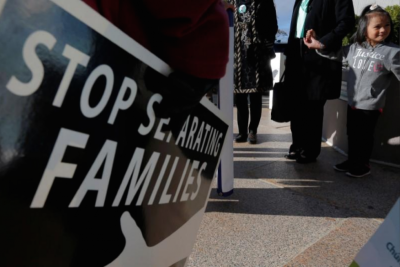If evangelicals are pro-family, then why don’t they care about Trump’s child separation policy?

A couple of days ago, Ed Krassenstein posted the following tweet decrying the widespread support among American (evangelical) Christians for Donald Trump’s divisive and xenophobic rhetoric against immigrants and refugees:
“Jesus Christ would tear down a wall, and give immigrants the shirt off of his back. I’m Jewish and I know this. What the hell has happened to Christianity in America?”
This prompted me to tweet the following reply:
“Go back a few decades and you’ll see that many Christians were supportive of segregation: Christianity Today published an article supporting it in the 1950s. And “progressives” like Reinhold Niehbuhr were SILENT on lynching. From that view, the Trumpists are a return to form.”
My tweet prompted a reply from an individual named Eric. While Eric denies that he is a supporter of Donald Trump, he clearly does support Trump’s stance on the border and immigration. And with that, an extended exchange began. In our exchange, I focused on Trump’s policy of separating children from their parents as a deterrent both to illegal immigrants and would-be refugees making legally valid claims for asylum on the southern border. This policy, as I pointed out, violates Article 9 of the United Nations Convention on the Rights of the Child. Here is the relevant excerpt from that convention:
“States Parties shall ensure that a child shall not be separated from his or her parents against their will, except when competent authorities subject to judicial review determine, in accordance with applicable law and procedures, that such separation is necessary for the best interests of the child.” (emphasis added)
Both Donald Trump and Jeff Sessions have explicitly stated that the Trump administration policy of separating parents from their children was intended not for the welfare of the child but rather as a deterrent. For that reason, the policy violates Article 9. And lest we think this is merely a matter of violating a UN convention, the real issue of moral concern is the ensuing trauma to children (and parents) that results from this policy.
In my view, this policy of child separation exemplifies the kind of issue that should be a matter of Christian moral concern. Christians should be speaking out to denounce this policy in the public square.
But did Eric agree? Here is our Twitter conversation beginning with Eric’s criticism of my original tweet. (Please note that I have left errata in the text uncorrected.)
Eric: Big difference…segregation was immoral. Illegal immigration is about laws. Christians that were for segregation were wrong but how can Christians that are for boarder safety be in the wrong? There is a difference between what we do as a Christian and what a country does.
RR: Everyone’s for “border safety”. As for the many things Trump does which violate Christian conviction, start with his hateful rhetoric against refugees (e.g. spreading leprosy?!) and his administration’s violation of article 9 of the UN Convention on the Rights of the Child. And of course, Christians who supported slavery, lynching, segregation, Jim Crow laws, etc. all had their rationalizations.
Eric: Agree with you about his rhetoric and I’m not a support of his but I am for making sure that our country secures it borders. And I disagree with you that everyone wants border safety bc if that were true we would have better measures to keep out illegal immigrants.
RR: You think Jesus would support Trump separating refugee children as young as 9 months old from their parents as a way to deter further refugees?
Eric: That’s an absurd question.
RR: That’s a lame answer.
Eric: Come with better intellectual questions. Jesus calls us to be the light in the world. I don’t think he would be dictating governmental policy. He calls us to be the ones making a difference…not government.
RR: Are you claiming that Christian conviction has nothing to say about the law and conduct of government? I hope not, because that would be an absurd position. Conversely, if you recognize that Christian conviction does have something to say, why deny it in this case?
Eric: No I’m stating that it is US, not the government, that should be the ones helping those in need. Jesus would be more concerned with the people not the policy. When we vote we definitely vote our Christian convictions but more importantly is what YOU do in your home and community.
RR: That’s a false dichotomy. God calls all creatures & institutions to behave rightly, including governments (Rom. 13). Furthermore, I’m not talking about helping, per se. I’m talking about an intentional policy of family separation that is doing enormous harm. What would Jesus say? Put it this way: if the US government was shooting refugee children at the border, would you give the same response? Or would you speak out? The latter, I hope. But then why not speak out in this case where the action, even if not equivalent to murder, is still clearly immoral?
Eric: I speak out against our government with my vote all the time. I vote against all pro-abortion candidates.
RR: But you don’t speak for the separation of refugee children from their parents? Why?
Eric: You can’t morally equate abortion and illegal immigration. For me, saving the life of an unborn child is more important then illegal immigrants having their children removed from them. I’m not saying that it is right but when picking between the two, I pick life.
RR: I see, so you only start caring when the child is killed? Being separated from their parents for weeks or months and suffering years of trauma and developmental delay as a result isn’t bad enough for you to care?
Eric: Well I’m a foster dad so I care a lot about the children both unborn and born. In politics one party is prolife and that’s how I vote. I care about these children but their parents know the laws and what happens when they break them.
RR: I’m sure you would care if you were separated from your children. I think it’s tragic that you seem not to care that the US government is violating international law and Christian ethics by separating refugee children from their parents.
Eric: I find it interesting that you are trying to paint me out to be an uncaring person. Why do you feel the need to attack my character?
RR: I think you’re morally inconsistent and the reasons are plain: You care about fetuses & the well being of American children but you don’t care when the USA government separates vulnerable refugee children from their parents. So I challenged you to expand your moral sphere.
Eric: Well it’s a good thing I care more about what Jesus thinks about my morals. He knows my heart on both issues. I’m pretty sure that Jesus wouldn’t attack someone’s character like you have but unfortunately we live in a day in age that social media draws out the worst.
RR: You oppose legislation that allows the termination of fetuses but you’re silent on the punitive practice of separating refugee children from their parents? And you don’t think Jesus would call out moral hypocrisy? The same Jesus who called people vipers and white-washed tombs?
Eric: I think you missed where I said it isn’t right to separate families. I am for strong borders and strong security. Feel free to go back and actually read my earlier tweet. And no I don’t think Jesus attacked people’s character.
RR: Do you agree that the state-supported separation of refugee children from their parents is a moral evil just as the state-supported segregation of races was a moral evil? If not, why not? And what was Jesus doing when he called people vipers, snakes, and white-washed tombs?
Eric: No I don’t support it. You retweeted and I was commenting on the wall. I think it’s morally ok to build a wall and have better national security He was using allegories to call out the Pharisees. You are calling me uncaring and attacking my character.
RR: Krassenstein was right: Jesus didn’t demonize the other; he welcomed them. As I pointed out in my original tweet, American Xians historically have often behaved precisely contrary to Jesus: e.g. slavery, segregation. That’s why I called Trump’s rhetoric & policy a return-to-form.
But you still didn’t answer my question. Do you agree that the state-supported separation of refugee children from their parents is a moral evil akin to the state-supported segregation of races? If not, why not? If so, why don’t you oppose it as you oppose abortion?
Finally, terms like “snake” and “white-washed tomb” are not allegories; they are metaphors which are clearly intended to provide a direct indictment of the moral character of particular religious leaders in Jesus’ community. I haven’t used any such labels in our exchange.
And that’s where our exchange ended. Sadly, while Eric clearly did think that Christian moral conviction required action against “pro-abortion” political candidates, he did not, by his own admission, believe that a policy of child separation was of sufficient moral concern to require a Christian response.



























